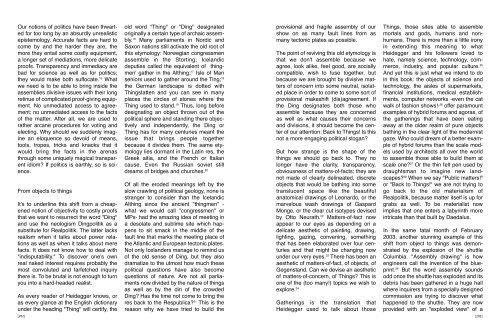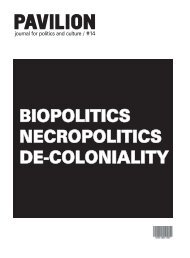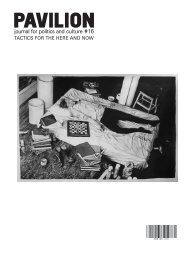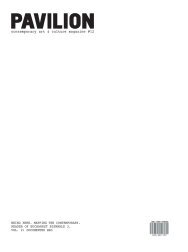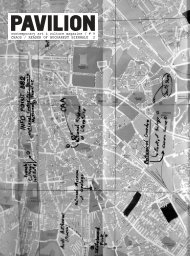PAVILION
PAVILION
PAVILION
- No tags were found...
You also want an ePaper? Increase the reach of your titles
YUMPU automatically turns print PDFs into web optimized ePapers that Google loves.
Our notions of politics have been thwarted<br />
for too long by an absurdly unrealistic<br />
epistemology. Accurate facts are hard to<br />
come by and the harder they are, the<br />
more they entail some costly equipment,<br />
a longer set of mediations, more delicate<br />
proofs. Transparency and immediacy are<br />
bad for science as well as for politics;<br />
they would make both suffocate. 15 What<br />
we need is to be able to bring inside the<br />
assemblies divisive issues with their long<br />
retinue of complicated proof-giving equipment.<br />
No unmediated access to agreement;<br />
no unmediated access to the facts<br />
of the matter. After all, we are used to<br />
rather arcane procedures for voting and<br />
electing. Why should we suddenly imagine<br />
an eloquence so devoid of means,<br />
tools, tropes, tricks and knacks that it<br />
would bring the facts in the arenas<br />
through some uniquely magical transparent<br />
idiom? If politics is earthly, so is science.<br />
From objects to things<br />
It's to underline this shift from a cheapened<br />
notion of objectivity to costly proofs<br />
that we want to resurrect the word "Ding"<br />
and use the neologism Dingpolitik as a<br />
substitute for Realpolitik. The latter lacks<br />
realism when it talks about power relations<br />
as well as when it talks about mere<br />
facts. It does not know how to deal with<br />
"indisputability." To discover one's own<br />
real naked interest requires probably the<br />
most convoluted and farfetched inquiry<br />
there is. To be brutal is not enough to turn<br />
you into a hard-headed realist.<br />
As every reader of Heidegger knows, or<br />
as every glance at the English dictionary<br />
under the heading "Thing" will certify, the<br />
old word "Thing" or "Ding" designated<br />
originally a certain type of archaic assembly.<br />
16 Many parliaments in Nordic and<br />
Saxon nations still activate the old root of<br />
this etymology: Norwegian congressmen<br />
assemble in the Storting; Icelandic<br />
deputies called the equivalent of thingmen'<br />
gather in the Althing; 17 Isle of Man<br />
seniors used to gather around the Ting; 18<br />
the German landscape is dotted with<br />
Thingstatten and you can see in many<br />
places the circles of stones where the<br />
Thing used to stand. 19 Thus, long before<br />
designating an object thrown out of the<br />
political sphere and standing there objectively<br />
and independently, the Ding or<br />
Thing has for many centuries meant the<br />
issue that brings people together<br />
because it divides them. The same etymology<br />
lies dormant in the Latin res, the<br />
Greek aitia, and the French or Italian<br />
cause. Even the Russian soviet still<br />
dreams of bridges and churches. 20<br />
Of all the eroded meanings left by the<br />
slow crawling of political geology, none is<br />
stranger to consider than the Icelandic<br />
Althing since the ancient "thingmen" -<br />
what we would call "congressmen" or<br />
MPs- had the amazing idea of meeting in<br />
a desolate and sublime site which happens<br />
to sit smack in the middle of the<br />
fault line that marks the meeting place of<br />
the Atlantic and European tectonic plates.<br />
Not only Icelanders manage to remind us<br />
of the old sense of Ding, but they also<br />
dramatize to the utmost how much these<br />
political questions have also become<br />
questions of nature. Are not all parliaments<br />
now divided by the nature of things<br />
as well as by the din of the crowded<br />
Ding? Has the time not come to bring the<br />
res back to the Respublica? 21 This is the<br />
reason why we have tried to build the<br />
provisional and fragile assembly of our<br />
show on as many fault lines from as<br />
many tectonic plates as possible.<br />
The point of reviving this old etymology is<br />
that we don't assemble because we<br />
agree, look alike, feel good, are socially<br />
compatible, wish to fuse together, but<br />
because we are brought by divisive matters<br />
of concern into some neutral, isolated<br />
place in order to come to some sort of<br />
provisional makeshift (dis)agreement. If<br />
the Ding designates both those who<br />
assemble because they are concerned<br />
as well as what causes their concerns<br />
and divisions, it should become the center<br />
of our attention: Back to Things! Is this<br />
not a more engaging political slogan?<br />
But how strange is the shape of the<br />
things we should go back to. They no<br />
longer have the clarity, transparency,<br />
obviousness of matters-of-facts; they are<br />
not made of clearly delineated, discrete<br />
objects that would be bathing into some<br />
translucent space like the beautiful<br />
anatomical drawings of Leonardo, or the<br />
marvelous wash drawings of Gaspard<br />
Monge, or the clear cut isotypes devised<br />
by Otto Neurath. 22 Matters-of-fact now<br />
appear to our eyes as depending on a<br />
delicate aesthetic of painting, drawing,<br />
lighting, gazing, convening, something<br />
that has been elaborated over four centuries<br />
and that might be changing now<br />
under our very eyes. 23 There has been an<br />
aesthetic of matters-of-fact, of objects, of<br />
Gegenstand. Can we devise an aesthetic<br />
of matters-of-concern, of Things? This is<br />
one of the (too many!) topics we wish to<br />
explore. 24<br />
Gatherings is the translation that<br />
Heidegger used to talk about those<br />
Things, those sites able to assemble<br />
mortals and gods, humans and nonhumans.<br />
There is more than a little irony<br />
in extending this meaning to what<br />
Heidegger and his followers loved to<br />
hate, namely science, technology, commerce,<br />
industry, and popular culture. 25<br />
And yet this is just what we intend to do<br />
in this book: the objects of science and<br />
technology, the aisles of supermarkets,<br />
financial institutions, medical establishments,<br />
computer networks -even the cat<br />
walk of fashion shows!- 26 offer paramount<br />
examples of hybrid forums and agoras, of<br />
the gatherings that have been eating<br />
away at the older realm of pure objects<br />
bathing in the clear light of the modernist<br />
gaze. Who could dream of a better example<br />
of hybrid forums than the scale models<br />
used by architects all over the world<br />
to assemble those able to build them at<br />
scale one? 27 Or the thin felt pen used by<br />
draughtsman to imagine new landscapes?<br />
28 When we say "Public matters!"<br />
or "Back to Things!" we are not trying to<br />
go back to the old materialism of<br />
Realpolitik, because matter itself is up for<br />
grabs as well. To be materialist now<br />
implies that one enters a labyrinth more<br />
intricate than that built by Daedalus.<br />
In the same fatal month of February<br />
2003, another stunning example of this<br />
shift from object to things was demonstrated<br />
by the explosion of the shuttle<br />
Columbia. "Assembly drawing" is how<br />
engineers call the invention of the blueprint.<br />
29 But the word assembly sounds<br />
odd once the shuttle has exploded and its<br />
debris has been gathered in a huge hall<br />
where inquirers from a specially designed<br />
commission are trying to discover what<br />
happened to the shuttle. They are now<br />
provided with an "exploded view" of a<br />
[202]<br />
[203]


